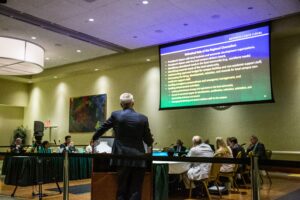Contentions with consolidation

State laws, student fees and shifting Student Government (SG) leadership continue to be on the minds of faculty and students as the July 1, 2020 consolidation deadline approaches.
After USF President Steve Currall provided a consolidation update Sept. 10 to the Board of Trustees (BOT), he received a fair amount of backlash from St. Pete and Sarasota-Manatee representatives as well as state officials.
The two branch campus representatives feared that too much power was being given to the Tampa campus and they are not alone in this.
There are now conversations circulating about Currall’s plan conflicting with Florida legislature.
Florida elected officials are not happy with the plan as they said it conflicts with a Florida law that prevents too much authority at one campus, according to the Tampa Bay Times.
In an email released to students and faculty, Currall acknowledged the frustration from the community and said the plan is merely a “framework to provide perspective.”
“I continue to invite feedback as I proceed with additional listening tour visits in the coming months,” Currall said.
While administrations from the branch campuses are disputing Currall’s plan, Dean of Student Danielle McDonald is looking on the bright side of consolidation.
She said she believes the plan will provide students with new programs and opportunities that they were never exposed to before.
“St. Pete has a sailing team, so this could be an opportunity for students from Tampa or Sarasota-Manatee to take advantage of,” McDonald said. “All three campuses will also have the opportunity to be involved in fraternity and sorority life.”
Even though students are able to utilize other campus programs, there is still a lot of uncertainty when it comes to creating a single student government (SG) across the three campuses.
Finalizing a consolidation plan for SG is crucial considering the Activity & Services (A&S) Fee, that every student pays, would have to be the same on each campus. For just the Tampa campus alone, about $17 million in A&S fees are distributed to student organizations every year.
In regards to student fees, the FAQ listed on USF’s website said students admitted for the spring 2020 semester will pay tuition and fees at “current local rates.” Tuition rates will not change until fall 2020 students are on campus.
The creators of the consolidation plan are still working out a system in which equitable fees and services can be organized. The Consolidation Plan documents emphasized that students at “every campus will benefit with this change.”
McDonald said she believes the leaders within SG will eventually settle on a plan that will bring unity to each campus.
“They are working out the details of how it will work, which is not an easy thing to do,” McDonald said. “I am confident that the student leaders of each campus will be able to find a structure that creates equity.”
An idea in the Consolidation Implementation Plan proposed that there will be a student body president at the system level and student representatives at each of the “home campuses.”
Because the three campuses will be voting on SG leaders, the elected student would need to be aware of what’s happening at each location.
“This will be important as students make their voting decisions,” McDonald said. “Student would have to vote based on who they believe would be best in representing all three campuses.”
Student fees among other affairs are still up in the air, however, USF spokesperson Adam Freeman said Currall will provide another update Dec. 3 at the next BOT meeting. He said Currall will be incorporating some of the additional feedback he continues to receive.
“The plan introduced was preliminary, discussions with various stakeholders are ongoing and an updated plan will be presented in the future,” Freeman said.
Looking forward, McDonald said she believes the main focus on consolidation will be student success.
“Students are in the forefront of the consolidation plan,” McDonald said. “The goal is to make sure that all students have equitable access that will contribute to their success.
“That really is the underlying principle in every conversation consolidation is in.”








